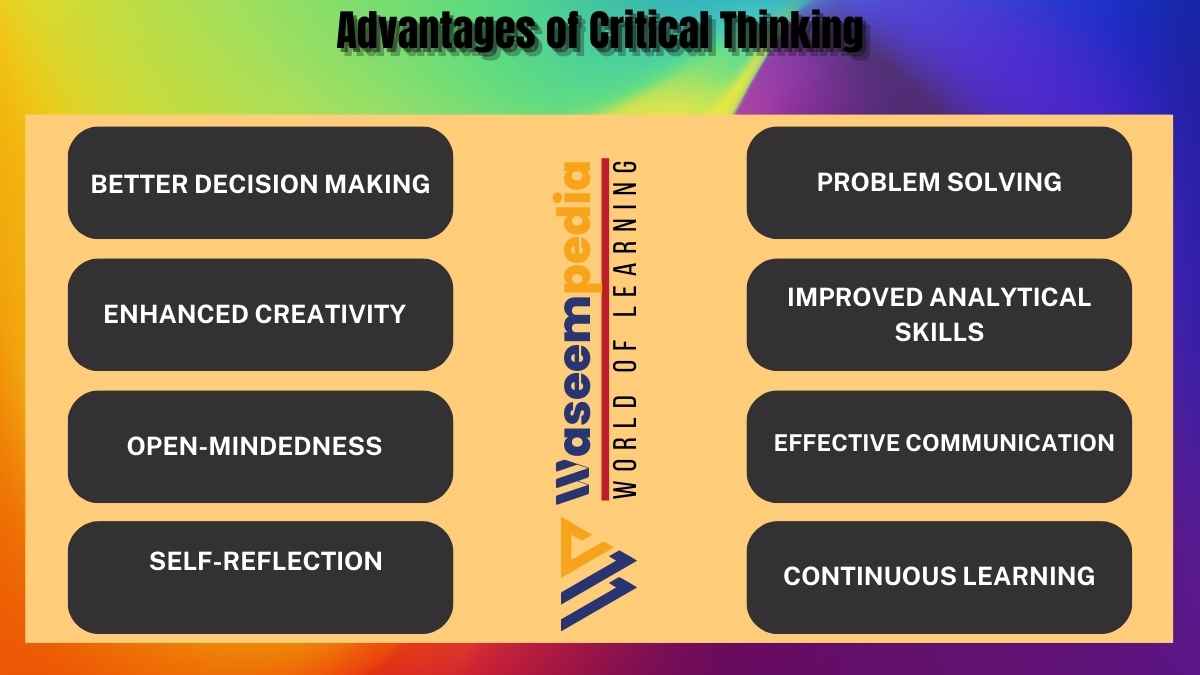There are Many Advantages of critical thinking Such as better problem-solving skills, improved decision-making abilities, enhanced creativity, stronger analytical skills, and greater resilience in facing challenges.
Critical thinking is a valuable skill that offers numerous advantages in both personal and professional life. From enhancing problem-solving abilities and decision-making skills to fostering creativity and innovation, the benefits of critical thinking are far-reaching. By cultivating critical thinking skills, individuals can navigate complex challenges, make informed decisions, and achieve success in various aspects of life.
Introduction to Critical Thinking
Critical thinking is a fundamental skill that involves analyzing, evaluating, and synthesizing information to make informed decisions and solve problems effectively. It is a cognitive process that enables individuals to question assumptions, consider alternative perspectives, and arrive at well-reasoned conclusions. The advantages of cultivating critical thinking skills extend far beyond the realm of academia, as they are essential for success in various aspects of life.
9 Advantages of Critical Thinking
There Are many Advantages of Critical Thinking But Waseempedia Explain the 9 Advantages of Critical Thinking That Are as followwing:
1. Enhanced Problem-Solving Abilities
One of the primary advantages of critical thinking is its ability to enhance problem-solving abilities. By systematically analyzing complex issues, identifying underlying factors, and considering multiple perspectives, individuals can develop innovative solutions to challenging problems. Critical thinkers are adept at breaking down problems into manageable components, devising strategies, and implementing effective solutions.
2. Improved Decision-Making
Critical thinking empowers individuals to make informed decisions based on logic, evidence, and reasoned analysis. By evaluating the potential consequences of different courses of action, considering available information, and weighing the pros and cons, individuals can make sound decisions that align with their goals and values. This ability to make reasoned judgments is invaluable in both personal and professional contexts.
3. Effective Communication Skills
Critical thinking is closely linked to effective communication skills, as it involves articulating ideas clearly, persuasively, and logically. Individuals who possess strong critical thinking skills can express themselves coherently, engage in meaningful dialogue, and influence others through compelling arguments. Whether in written or verbal form, effective communication is essential for conveying ideas, fostering collaboration, and building relationships.
4. Increased Creativity and Innovation
Critical thinking fosters creativity and innovation by encouraging individuals to think outside the box, challenge conventional wisdom, and explore unconventional solutions. By questioning assumptions, seeking alternative perspectives, and embracing ambiguity, critical thinkers can generate novel ideas and approaches to problem-solving. This creative mindset fuels innovation and drives progress in various fields.
5. Enhanced Analytical Skills
Analytical thinking is a core component of critical thinking, enabling individuals to assess information critically, identify patterns, and draw logical conclusions. By honing their analytical skills, individuals can evaluate the credibility of sources, detect biases, and distinguish between fact and opinion. This ability to analyze information critically is essential for making well-informed decisions and solving complex problems.
6. Improved Self-Reflection and Growth
Critical thinking encourages self-reflection and continuous personal growth by prompting individuals to examine their beliefs, assumptions, and biases. Through introspection and self-awareness, individuals can identify areas for improvement, challenge their own thinking, and adapt to new information and perspectives. This process of self-reflection fosters intellectual humility, openness to learning, and a willingness to reconsider one’s views.
7. Better Conflict Resolution Skills
Conflict is inevitable in both personal and professional settings, but critical thinking can facilitate constructive conflict resolution. By approaching conflicts with an open mind, listening to opposing viewpoints, and seeking common ground, individuals can find mutually acceptable solutions that address underlying issues. Critical thinkers are adept at de-escalating conflicts, promoting understanding, and fostering collaborative relationships.
8. Enhanced Academic Performance
Critical thinking is essential for academic success, as it enables students to analyze complex texts, engage with challenging concepts, and develop well-supported arguments. Students who cultivate critical thinking skills are better equipped to excel in their studies, participate actively in class discussions, and produce high-quality academic work. Critical thinking is a foundational skill that lays the groundwork for lifelong learning and intellectual growth.
9. Improved Professional Success
Critical thinking is highly valued in the workplace, as it is associated with enhanced problem-solving abilities, effective decision-making, and strong leadership qualities. Employees who demonstrate critical thinking skills are better equipped to navigate complex challenges, adapt to changing circumstances, and drive innovation within their organizations. Critical thinking is a key competency sought after by employers across industries and is essential for professional success and advancement.

